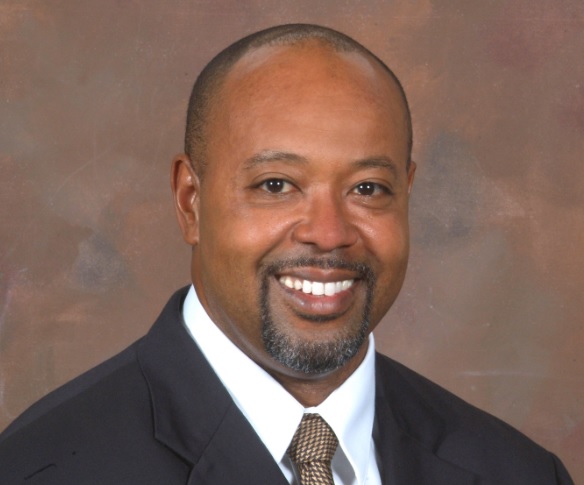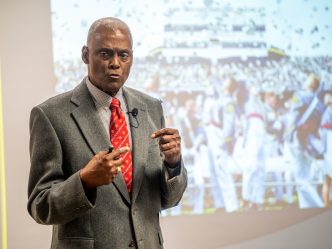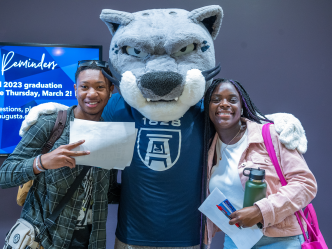As Black History Month was about to kick off, Vice President for Diversity and Inclusion Kent Guion took some time to sit at the side table in his office in the G. Lombard Kelly Administration Building to talk about the intersection of black history with general history and the importance of connections.
“I think history is fairly stable until you begin to put the connections together, and that’s when it really becomes interesting,” he said. “I think that’s an important element of why recognizing and understanding contributions is an ongoing part of what we do.”
Over the years, he said, Black History Month has shifted away from a narrower focus on civil rights and individual accomplishments to include broader elements that are more reflective of life in general.
“You think about something like a sports figure crossing a color barrier,” he said. “That meant something at one point for sports, but when you get to see how that influences other kinds of activities, like public policy, and when you piece it all together, you see that one event sets up the opportunity for others to happen. It may have once been mainly significant to baseball, but really, when you look at it closely, it was about a lot more.”
Created four years ago, the Office of Diversity and Inclusion handles cultural competency issues, works with international students and employees, and also works to ensure that everyone has equal access to job opportunities.
“We want to create and maintain an environment here on campus that is very inclusive,” he said. “It’s a lot about awareness, a lot about education, and we want it to be embraceable. Many of the activities are open to whoever is able to participate, and many times we have activities that faculty, staff, and students will actually be the lead on.”
Students in particular learn a lot from putting on an event themselves, he said.
This year’s Black History Month will include cooking demonstrations at the Terrace Café, a black history trolley tour sponsored by the Lucy Craft Laney Museum and SouthStar Trolley, a James Brown Academy of Musik Pupils (JAMP) performance at the Terrace Café, and an ongoing trivia contest, something Guion first used in conjunction with Hispanic Heritage Month.
“I was astounded by the number of people who did the trivia the last go around We had over 12,000 visits to the trivia question webpage” he said.
For a more comprehensive list of events, click here.
In keeping with the national theme, this year’s events celebrate a century of black life history and culture. A hundred years ago, Carter G. Woodson, considered the father of Black History Month, began to formulate his ideas concerning the celebration.
For a short video about Woodson, click here.
“I like to think of it as unique, but also united,” Guion said of singling out recognition for black achievement. “We can have specialties and variety, but it really is about the community that we build. And I think that’s one of the components that allows there to be a lot of participation.”
Guion, who has a master’s in physical education with an emphasis on exercise physiology as well as an MD, has been in Augusta for 12 years, arriving as an associate dean in allied health sciences, where part of his role was to develop cultural competency and learning opportunities for students. He later became the interim dean for allied health sciences for nearly two years. Four years ago, when President Ricardo Azziz decided a diversity and inclusion office was needed, he appointed Guion to head it up.
After 21 years in the University System of Georgia, Guion recently accepted a position at the University of North Carolina Wilmington and will be leaving at the end of March.
Before coming to Augusta, Guion was at Georgia Southern during a time of unprecedented growth, so he’s enjoyed a unique perspective regarding GRU’s consolidation and expansion.
“When I was at Georgia Southern, I think it went from 8,000 students to nearly 18,000, so I had a sense of what change on that scale would feel like,” he said. “I’ve always been an optimistic person when it comes to change. To be able to see 20 years down the road is the viewpoint that I’ve always had, and felt I like, wow, to have a unified university in a community of this size, – what a great thing. We know we’ve got to get through this early phase, but really, how beneficial could that be for the community, especially a couple decades from now?”
While building diversity is a stated goal of the university, Guion admitted it’s not one that’s easy to achieve, given the internal tension between being unique and united.
“But when you can embrace both of those concepts, I think it all makes so much more sense,” he said. “Black History Month is just as much our history as it is black history, though it’s a difficult concept to grasp when it looks as if it’s being separated.”
It comes back, he said, to making those connections.
“I think, as a society, we’re working through it,” he said. “I think once we understand the importance of how all of these complex pieces fit together, these occasions will become much more just a part of who we are: our identity. At least that’s my hope.”
 Augusta University
Augusta University




